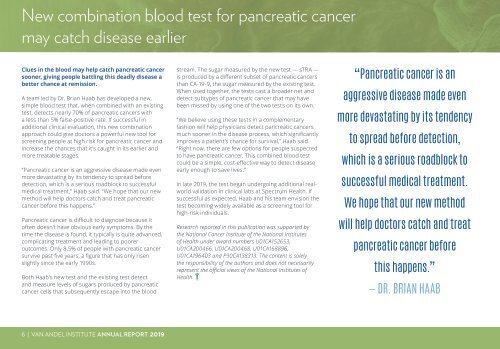2019 Annual Report
You also want an ePaper? Increase the reach of your titles
YUMPU automatically turns print PDFs into web optimized ePapers that Google loves.
New combination blood test for pancreatic cancer<br />
may catch disease earlier<br />
Clues in the blood may help catch pancreatic cancer<br />
sooner, giving people battling this deadly disease a<br />
better chance at remission.<br />
A team led by Dr. Brian Haab has developed a new,<br />
simple blood test that, when combined with an existing<br />
test, detects nearly 70% of pancreatic cancers with<br />
a less than 5% false-positive rate. If successful in<br />
additional clinical evaluation, this new combination<br />
approach could give doctors a powerful new tool for<br />
screening people at high risk for pancreatic cancer and<br />
increase the chances that it’s caught in its earlier and<br />
more treatable stages.<br />
“Pancreatic cancer is an aggressive disease made even<br />
more devastating by its tendency to spread before<br />
detection, which is a serious roadblock to successful<br />
medical treatment,” Haab said. “We hope that our new<br />
method will help doctors catch and treat pancreatic<br />
cancer before this happens.”<br />
Pancreatic cancer is difficult to diagnose because it<br />
often doesn’t have obvious early symptoms. By the<br />
time the disease is found, it typically is quite advanced,<br />
complicating treatment and leading to poorer<br />
outcomes. Only 8.5% of people with pancreatic cancer<br />
survive past five years, a figure that has only risen<br />
slightly since the early 1990s.<br />
Both Haab’s new test and the existing test detect<br />
and measure levels of sugars produced by pancreatic<br />
cancer cells that subsequently escape into the blood<br />
stream. The sugar measured by the new test — sTRA —<br />
is produced by a different subset of pancreatic cancers<br />
than CA-19-9, the sugar measured by the existing test.<br />
When used together, the tests cast a broader net and<br />
detect subtypes of pancreatic cancer that may have<br />
been missed by using one of the two tests on its own.<br />
“We believe using these tests in a complementary<br />
fashion will help physicians detect pancreatic cancers<br />
much sooner in the disease process, which significantly<br />
improves a patient’s chance for survival,” Haab said.<br />
“Right now, there are few options for people suspected<br />
to have pancreatic cancer. This combined blood test<br />
could be a simple, cost-effective way to detect disease<br />
early enough to save lives.”<br />
In late <strong>2019</strong>, the test began undergoing additional realworld<br />
validation in clinical labs at Spectrum Health. If<br />
successful as expected, Haab and his team envision the<br />
test becoming widely available as a screening tool for<br />
high-risk individuals.<br />
Research reported in this publication was supported by<br />
the National Cancer Institute of the National Institutes<br />
of Health under award numbers U01CA152653,<br />
U01CA200466, U01CA200468, U01CA168896,<br />
U01CA196403 and P30CA138313. The content is solely<br />
the responsibility of the authors and does not necessarily<br />
represent the official views of the National Institutes of<br />
Health.<br />
“Pancreatic cancer is an<br />
aggressive disease made even<br />
more devastating by its tendency<br />
to spread before detection,<br />
which is a serious roadblock to<br />
successful medical treatment.<br />
We hope that our new method<br />
will help doctors catch and treat<br />
pancreatic cancer before<br />
this happens.”<br />
— DR. BRIAN HAAB<br />
6 | VAN ANDEL INSTITUTE ANNUAL REPORT <strong>2019</strong>

















